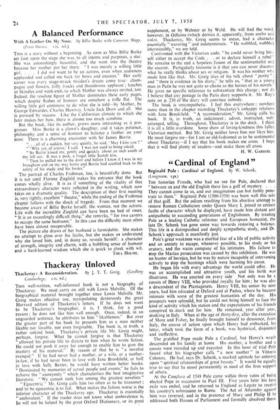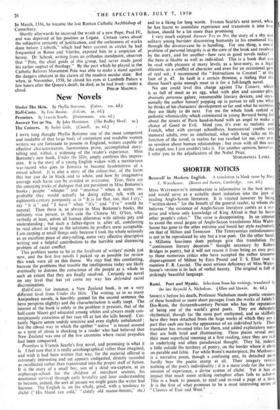c4 Cardinal of England 97
THE historian Fronde, who had no use for Pole, declared that " between us and the old English there lies a gulf of mystery. . . . They cannot come to us, and our imagination can but feebly pene-
trate to them." Reginald Pole (1500-1558) was born well this side of that gulf. But the odium resulting from his abortive attempt to
restore Roman Catholicism under Queen Mary I, joined to certain faults of character which he displayed, have made him distant and antipathetic to succeeding generations of Englishmen. By treating
Pole as a leading Catholic reformer and European humanist, the late Dr. Schenk has gone some way towards restoring a balance. This life is a distinguished and deeply sympathetic study, and Dr. Schenk's approach is manifestly just.
Pole's great weakness was a morbid fear of a life of public activity and an anxiety to escape, whenever possible, to his study or his
oratory, and the warm company of his intimates. His failure to stop the Marian persecution was caused by this inhibition. He was no hunter of herecics, but he was by nature incapable of intervening actively to stop the burnings which were harming his cause.
He began life with every advantage the world could offer. He was an accomplished and attractive youth, and his birth was
illustrious. He was courted on every side- Not only was he a
cousin of Henry VIII, who provided royally for him ; he was also a descendant of the Plantagenets. Henry VIII, his senior by nine years, had him educated at Oxford and at Padua, where he became intimate with some of the greatest humanists of the day. His prospects were splendid, but he could not bring himself to face the kind of activity which his station and the expectations of his friends conspired to .mark out for him. He remained, year after year, studying in Italy. When at the age of thirty-five, after the execution of More and Fisher, he finally brought himself to denounce, from Italy, the course of action upon which Henry had embarked, his letter, which took the form of a book, was hysterical, disjointed and ineffective.
The gratified Pope made Pole a Cardinal, but Henry's wrath descended on his family at home His mother, a brother and a cousin were rounded up and executed In this hour of trial, Pole found what his biographer calls " a new mother " in Vittoria Colonna. He had, says Dr. Schenk, a marked aptitude for entering upon " spiritual relationships of great beauty." It would be equally true to say that he stood permanently in need of the firm support of others.
At the Conclave of 1549 Pole came within three votes of being elected Pope in succession to Paul III. Five years later his long exile was ended, and he returned to England as Legate to receive his country's submission to Rome. The Act of Attainder against him was reversed, and in the presence of Mary and Philip H he addressed both Houses of Parliament and formally absolved them.
In March, 1556, he became the last Roman Catholic Archbishop of Canterbury.
Shortly afterwards he incurred the wrath of a new Pope, Paul IV, and was deprived of his position as Legate. Certain views about the subjective certainty of justification, and the uselessness of works done before ' rebirth," which had been current in circles he had frequented in Rome and Viterbo, exposed him to a suspicion of heresy. Dr. Schenk, writing from an orthodox standpoint, observes that " Pole, the chief guide of this group, had never made good his earlier neglect of theology." By the part which he played in the Catholic Reform Movement Pole was able to make a stand against the dangers inherent in the claims of the modern secular state. But when, in November, 1558, he closed his eyes at Lambeth Palace a few hours after the Queen's death, he died, as he had lived—under a cloud. PHILIP MAGNUS.







































 Previous page
Previous page